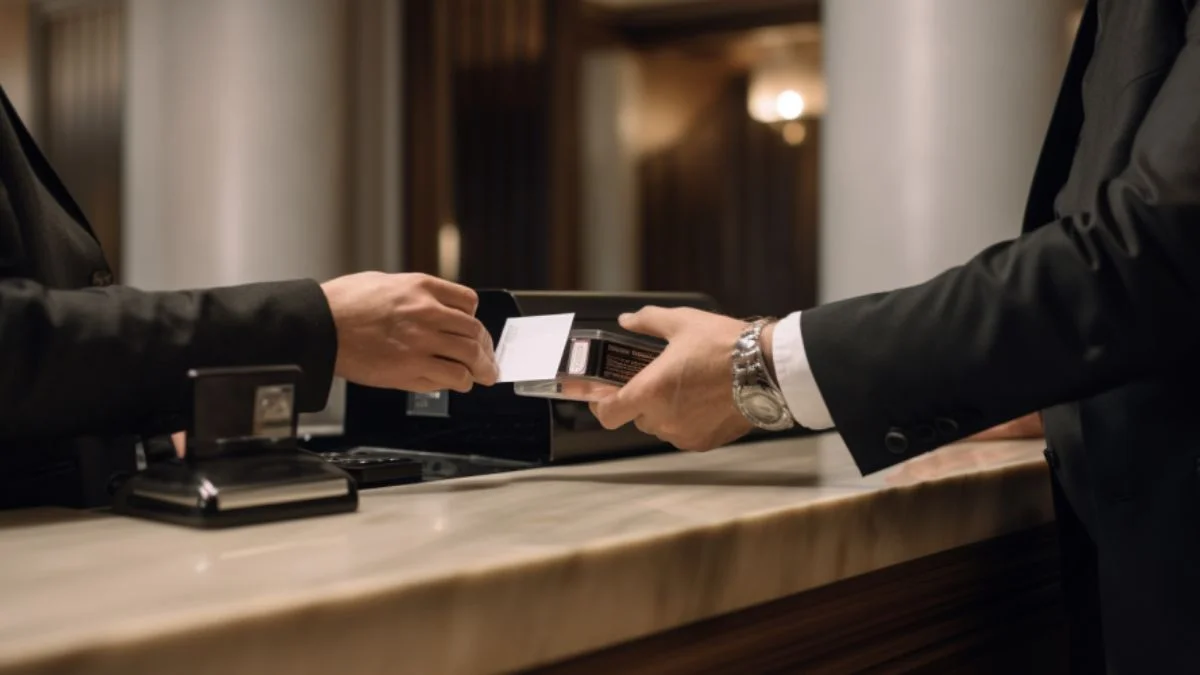Hotel Credit Card Hold: How It Works and Why Hotels Use It

As participants in Amazon Associates and other programs, we earn from qualifying purchases. This comes at no additional cost to you. For more details, see our Affiliate Disclosure.
When you check into a hotel, you’re often asked to provide a credit card which is used not only for charging your stay but also for a practice known as a “credit card hold.” This common process can be perplexing, particularly if you’re not familiar with it, and can lead to unexpected surprises on your bank statement. Understanding the concept of a hotel credit card hold, how it works, and why hotels use it is critical to manage your finances effectively during travel and to avoid potential mishaps.
In this article, we’ll delve into the intricate mechanics of hotel credit card holds, shedding light on the nuances of this common practice and clarifying why it’s a cornerstone of the hotel industry’s payment system. We aim to demystify this process, addressing key questions and concerns you might have, and ultimately empowering you with the knowledge to navigate your future hotel stays confidently and comfortably.
Understanding Hotel Credit Card Holds: The Basics
A hotel credit card hold, often referred to as a pre-authorization hold, is a temporary freeze or block on a specific amount of funds in a guest’s account. This process ensures that the hotel can cover any potential charges the guest may incur during their stay, including room service, mini-bar usage, restaurant bills, damages, or any additional services. While it’s not a charge, a hold affects the available balance on your credit or debit card, making the held amount inaccessible until the hold is released.
Hotels typically place this hold at check-in, and the exact amount can vary. Some hotels may hold a fixed amount per night, while others may hold an estimate based on the length of stay and room rate. It’s worth noting that holds are more commonly placed on credit cards, but they can also occur with debit card transactions. The critical aspect to remember is that while the money is held, it isn’t actually removed from your account; it is merely reserved and temporarily inaccessible.
Understanding the concept of a hotel credit card hold is crucial as it can impact your available balance or credit limit during your stay. It’s always a good idea to inquire about a hotel’s hold policy at check-in to avoid any potential financial surprises.
How Hotel Credit Card Holds Work: A Step-by-Step Explanation
The process of a hotel credit card hold can seem complicated, but once you break it down, it becomes quite straightforward. Here’s a step-by-step guide on how the process generally works:
1. Check-In: At check-in, the hotel will ask for your credit or debit card information. This is in addition to any information you might have provided while making your reservation.
2. Pre-Authorization: The hotel then contacts your bank to put a hold on a certain amount of funds. This amount is usually based on the cost of your stay, plus a certain percentage or flat fee for potential incidental charges.
3. Hold Confirmation: If approved, your bank will set aside the requested amount in your account. This amount is now ‘held’ and will not be accessible for other transactions. It’s essential to note that this isn’t a charge and it will not appear as a transaction on your statement. However, it will reduce your available credit limit or account balance.
4. Stay and Incidental Charges: During your stay, any incidental charges you incur (room service, mini-bar, etc.) will be tracked by the hotel.
5. Check-Out and Final Charge: At check-out, your final bill is calculated. This includes the room charges and all the additional incidental charges incurred during your stay.
6. Release of Hold: If the final bill is less than the hold amount, the hotel will release the remainder of the hold. This release informs your bank that the hotel will not be claiming the full amount of the hold.
7. Hold Release Processing: The timing for the hold release can vary based on the hotel and your bank. It may take several days for the funds to become available again in your account.
Always remember to check with the hotel about their hold policy, as specifics can vary from one establishment to another.
The Role of Hotel Credit Card Holds in Risk Management
Hotel credit card holds play a vital role in risk management for hotels, protecting them from potential financial losses. They act as a safeguard, providing a buffer against unforeseen expenses, non-payment, and potential damages, thereby contributing to a stable business operation. Here’s a closer look at how these holds assist in risk management:
1. Guarantee of Payment: Holds ensure that hotels have a guaranteed method of payment for a guest’s stay. They eliminate the risk of a guest leaving without settling their bill, as the hotel can capture the hold amount if necessary.
2. Covering Incidentals: Not all costs associated with a guest’s stay are known upfront. Guests may opt to use additional services, such as room service, spa treatments, or mini-bar items. A credit card hold provides assurance that funds are available to cover these incidental charges.
3. Protection Against Damages: Accidents and damages can occur, even with the most careful guests. If a guest causes damage to the room or other hotel property, a hold ensures that the hotel can recover some or all of the costs associated with repairs or replacements.
4. Minimizing Credit Card Fraud: Credit card holds also help hotels verify the legitimacy of a card. The pre-authorization process can help detect fraudulent cards, thereby reducing the risk of losses due to fraud.
They help ensure the financial stability of the hotel while allowing guests to enjoy their stay without the hassle of immediate payments for each service.
Differences between Pre-Authorizations, Deposits, and Holds
In the realm of hotel financial transactions, the terms “pre-authorizations,” “deposits,” and “holds” often surface, sometimes used interchangeably. However, each has a distinct meaning and understanding their differences can be crucial for a seamless hotel stay. Let’s explore these terms in more detail:
Pre-Authorizations
A pre-authorization is a temporary hold of a specified amount against the available funds on a credit or debit card. The hotel uses this process to verify that the card is valid and has sufficient funds to cover the cost of the room and any potential incidental expenses.
It’s important to note that a pre-authorization isn’t a charge, but it does decrease the available balance or credit limit. The pre-authorization is typically released once the final bill is paid, though the timing can vary based on the hotel and the bank.
Holds
A hold, often used synonymously with pre-authorization, is a practice where banks set aside or “hold” a certain amount of a customer’s money for potential use.
This practice is prevalent in hotels, rental car companies, and other businesses that want to secure an amount for future charges. In the context of a hotel stay, this could include the room cost, taxes, and potential incidental expenses.
Deposits
Unlike a pre-authorization or hold, a deposit involves an actual transfer of funds and is more often associated with cash or check transactions, although card transactions can also involve deposits. In a hotel setting, a deposit is typically requested up-front, and the amount is subtracted from your final bill upon check-out.
If the charges do not amount to the deposit, the remaining balance is returned. A deposit provides a guarantee similar to a hold but involves a physical transfer of funds.
Impact of Hotel Credit Card Holds on Your Finances
The practice of hotel credit card holds can significantly impact your finances, particularly if you’re unaware of the process or the amount of the hold. Here are some key ways that a credit card hold from a hotel could affect your financial situation:
1. Reduced Available Balance or Credit Limit: When a hotel places a hold on your credit card, the amount is blocked and isn’t available for other transactions. This reduction can be particularly impactful if you’re nearing your credit limit or if the hold is significant in relation to your total available credit.
2. Potential Overdraft Fees: If the hold is placed on a debit card and you’re not aware of it, you might spend more than your available balance, leading to overdraft fees. It’s crucial to remember that even though the hold amount isn’t a charge, it does temporarily lower your available balance.
3. Impact on Credit Utilization Ratio: If the hold is large and remains on your account when your credit card issuer reports to the credit bureaus, it could increase your credit utilization ratio, which could potentially impact your credit score. However, this effect is usually temporary and will correct itself once the hold is released.
4. Delays in Hold Release: Depending on the hotel and your bank, it may take several days for a hold to be released after you check out. If you’re not expecting this delay, it could potentially disrupt your financial plans.
To mitigate these impacts, it’s recommended to inquire about the hotel’s hold policy when you check in and to keep track of any holds placed on your account. It can also be beneficial to use a credit card rather than a debit card for hotel stays to avoid potential overdraft issues.
Factors Influencing the Amount of Credit Card Holds
The amount of a credit card hold can vary significantly from one hotel to another, and several factors influence this amount. Understanding these can help you better anticipate the potential hold during your hotel stay:
1. Room Rate: The base rate for your room per night often plays a significant role in determining the hold amount. Typically, the hotel will hold an amount equal to your room rate for the duration of your stay, plus a percentage or flat amount for potential incidentals.
2. Length of Stay: The longer your stay, the higher the hold amount, as this will multiply the daily room rate and increase potential incidental costs.
3. Hotel’s Policy on Incidentals: Each hotel has its own policy for covering potential incidental expenses, such as room service, mini-bar charges, spa services, etc. Some hotels may hold a fixed amount per day for incidentals, while others may base it on a percentage of the room rate.
4. Hotel’s Category and Pricing: Higher-end hotels or resorts often have higher hold amounts, reflecting the more expensive services and amenities available to guests.
5. Past Guest Behavior: In some cases, hotels may adjust their hold amounts based on past experiences or patterns of guest behavior. If a hotel often encounters guests who heavily use incidentals or cause damage, they may implement higher holds to cover potential costs.
6. Local Laws and Regulations: In some areas, local laws and regulations may cap the amount a hotel can hold on a credit card, or they may provide guidelines that hotels follow.
The hold amount can significantly impact your available credit or account balance during your stay, so it’s always a good idea to inquire about the hotel’s hold policy when you book your stay or upon check-in.
How Long Can a Hotel Hold Your Money? Understanding Release Times
The length of time a hotel can hold your money – or, more accurately, the duration of the hold on your credit or debit card – can vary significantly and depends on several factors:
- Hotel Policy: Each hotel has its own policy regarding the duration of holds. Most hotels release the hold on your funds shortly after you check out, once all charges have been accounted for. However, the exact timeframe can differ from one establishment to another.
- Type of Card: The type of card used for the hold can also influence the duration. Holds on credit cards tend to be released sooner than those on debit cards, as the release process can be more complicated with banks when a debit card is used.
- Your Bank’s Policies: After a hotel requests the release of a hold, your bank still needs to process the request. The time this takes can vary greatly depending on the bank’s policies and procedures. Some banks can release the funds within 24 hours, while others might take several business days.
On average, most holds are released within 2-5 business days from the day of your check-out. But in some cases, it can take up to 15 days or even longer, particularly with some debit cards.
If you’re concerned about the length of a hold, it can be beneficial to use a credit card for hotel stays, as holds are generally released faster on credit cards than on debit cards. Additionally, always feel free to ask the hotel about their hold release policy at check-in, so you’re fully informed about when to expect the funds to become available again.
Disputing Unjustified Credit Card Holds: Steps to Follow
If you find an unjustified credit card hold from a hotel on your account, there are steps you can take to dispute it. Remember that communication is key in these situations and it’s crucial to keep track of all interactions and documents. Here’s what you need to do:
1. Contact the Hotel: The first step is to contact the hotel directly. Ask for a detailed explanation of the hold, and if it seems to be a mistake, politely request that they release it. Make sure to keep a record of who you speak to, the time and date of the conversation, and what was discussed.
2. Document Everything: If the hotel has made an error, ask for written confirmation of this. If the dispute relates to a specific charge (e.g., a charge for a mini-bar item you didn’t consume), having evidence to support your claim will be very helpful.
3. Follow up with Your Bank or Credit Card Provider: If the hotel does not resolve the issue to your satisfaction, you should contact your bank or credit card provider. Explain the situation clearly, provide them with any evidence you have, and ask them to dispute the hold.
4. Formal Dispute Process: Your card provider will guide you through the formal dispute process. This typically involves filling out a dispute form, explaining the situation in detail, and providing any supporting documentation.
5. Wait for Resolution: The bank or credit card issuer will then investigate your dispute, which may involve contacting the hotel. This process can take some time, so be prepared to wait.
Misunderstandings and errors can occur, but they are usually resolvable with clear communication and persistence. Always check your account statements regularly to catch any potential errors quickly.
Top Tips for Managing Hotel Credit Card Holds
Effectively managing hotel credit card holds requires a clear understanding of the process and a proactive approach. Here are some top tips to help you navigate this common hotel practice:
1. Ask About the Hold Policy at Check-In: Before providing your card information, ask the hotel about their hold policy. Knowing the expected amount and length of the hold can help you plan your finances better during your stay.
2. Use a Credit Card Instead of a Debit Card: If possible, use a credit card for hotel stays. Holds on credit cards are generally released faster than those on debit cards, and you won’t run the risk of overdrawing your account.
3. Keep Track of Your Expenses: Be aware of any additional charges you might be incurring during your stay, such as room service, mini-bar usage, or other amenities. These will be deducted from the hold amount.
4. Check Your Account Regularly: Keep an eye on your account balance and transactions throughout your stay and after you’ve checked out. This will allow you to spot any errors or unexpected holds quickly.
5. Keep All Receipts and Documentation: In case of any discrepancies or disputes, having all your receipts and documentation will provide necessary evidence and make the resolution process easier.
6. Have Sufficient Funds or Credit: Ensure that your account has enough funds or available credit to cover both the hotel hold and any other expenses you anticipate during your stay. This will help avoid potential overdraft fees or declines.
7. Follow up on Release of Holds: After checking out, keep an eye on your account to make sure the hold is released within the timeframe provided by the hotel. If it’s not, don’t hesitate to contact the hotel or your bank.
Can A Hotel Put A Hold On A Maxed Out Credit Card?
In general, hotels cannot place a hold on a maxed-out credit card. When you check into a hotel, one of the first steps is to provide a credit or debit card, which the hotel uses to put a hold on a certain amount of funds. This process, called pre-authorization, is used to ensure that the card has sufficient available credit to cover the estimated cost of the stay, including any potential incidental charges.
If a credit card is maxed out, meaning it has reached its credit limit, the pre-authorization process will likely be declined by the card issuer. In this case, the hotel may ask for another form of payment or may require a cash deposit to cover potential expenses during the stay. If you’re planning a hotel stay, it’s important to ensure that your card has enough available credit not only for the cost of the room but also for the additional hold amount.
How Long Does it Take for a Hotel to Release a Hold on a Debit Card?
The time it takes for a hotel to release a hold on a debit card can vary widely based on both the hotel’s policies and the bank’s policies. On the hotel’s end, the hold is usually released shortly after you check out, once they’ve had a chance to finalize your bill and ensure there are no additional charges for incidentals. This process typically takes a few hours to a day, but it can occasionally take longer, especially at larger hotels or during busy periods.
However, even after the hotel has released the hold, the funds may not be immediately available in your account. This is because your bank also needs to process the release, and the speed at which they do this can vary significantly. Some banks can process the release within 24 hours, while others might take several business days.
On average, you can expect the hold to be fully released within 2-5 business days of checking out of the hotel. However, it’s always a good idea to check with your bank to understand their specific policies regarding the release of holds, as it can sometimes take up to 15 days or more.
How Long Does It Take For A Hotel To Remove Hold From Credit Card?
Similar to debit cards, the length of time it takes for a hotel to remove a hold from a credit card can vary based on the hotel’s and the credit card issuer’s policies. After you’ve checked out and the hotel has tallied any final charges, the hotel will usually release the hold. This can happen within a few hours to a day, though it may take longer during particularly busy times or at larger hotels.
Once the hotel has released the hold, your credit card issuer then needs to process the release. The timeline for this process varies from one financial institution to another. Some credit card issuers release the funds swiftly, often within 24 hours, while others may take a few business days.
On average, most holds on credit cards are released within 2-5 business days after check-out. However, it’s always a good idea to contact your credit card issuer to understand their specific policies, as it can sometimes take up to 15 days or more for the hold to be completely removed from your account.






